Single Men - The Holy See MMU
- Thread starter unmerged(90806)
- Start date
-
We have updated our Community Code of Conduct. Please read through the new rules for the forum that are an integral part of Paradox Interactive’s User Agreement.
You are using an out of date browser. It may not display this or other websites correctly.
You should upgrade or use an alternative browser.
You should upgrade or use an alternative browser.
Baberinis' unbridled influence couldn't last forever...
So, Burgundy is the new kid on the block?
So, Burgundy is the new kid on the block?
I'm glad that the Berberini's often malignant influence over the Papacy seems to now be waning. In this respect Leo did very well during his short reign. Burgundy certainly seem a considerable power.
loki100:
Athalcor:
As for France, it seems the worst is behind it. But it's still much weaker than normally. England and Portugal have chunks of the French territory on the West and on its eastern border there is the Emperor and medium powers of Burgundy and Savoy.
Well, the Tsardom (still don't know why 'tsardom') of the Ottoman Empire with Orthodox Bulgarian lands as its core is weird. Sort of my doing.
The Papacy fights the infidels and heretics, hence my acquisitions in the East; to expand in Italy I'd need some pretence of legitimacy.
Papal Curia names sound funny, but are pbly names of powerful families (in Rome/Italy) and actually might represent the Camerlengo, who played the role of the head of the Papal State during sede vacante.
blsteen: Short-lived Pope, true; but the Jesuits, having experienced their ups and downs, have been in their 'ups' phase for some time; so I hope their rise to prominence is not implausible.
aldriq:
 :ninja:
:ninja:
morningSIDEr:
aldriq and morningSIDEr, you two might soon get short-listed for a meeting with...
Burgundy, like France, is Protestant, so far the Emperors were either from Austria or Bohemia. With the Protestant Palatinate taking over, Jesuits were banned from Low Lands. Actually, some time earlier Bohemian Emperors tried converting some Low Lands provs (Jesuit missions and sending missionaries (chances around 1%); which I didn't like as the HRE tolerated all faiths; but now the Protestants quickly reclaim this area for their creed.one question though, I assume at the start it was Burgundian emperors inviting the Jesuits to the Netherlands? In any case do you now plan to try and build them up as a counterweight to Bohemia?
Athalcor:
Poland has this odd shape after being seriously crippled by Russia (recently suspiciously dormant), but it's on the rise now (beat Bohemia, claimed the Baltic, PU with Denmark, incorporated Lithuania).Poland is shaped rather weirdly.
How powerful is France?
Well, Ottos almost = Bulgaria, so.
I forgot how small are your Italian holdings.
Pope Papal Curia Odescalchi

As for France, it seems the worst is behind it. But it's still much weaker than normally. England and Portugal have chunks of the French territory on the West and on its eastern border there is the Emperor and medium powers of Burgundy and Savoy.
Well, the Tsardom (still don't know why 'tsardom') of the Ottoman Empire with Orthodox Bulgarian lands as its core is weird. Sort of my doing.
The Papacy fights the infidels and heretics, hence my acquisitions in the East; to expand in Italy I'd need some pretence of legitimacy.
Papal Curia names sound funny, but are pbly names of powerful families (in Rome/Italy) and actually might represent the Camerlengo, who played the role of the head of the Papal State during sede vacante.
blsteen: Short-lived Pope, true; but the Jesuits, having experienced their ups and downs, have been in their 'ups' phase for some time; so I hope their rise to prominence is not implausible.
aldriq:
Oh, couldn't it?Baberinis' unbridled influence couldn't last forever...
morningSIDEr:
Malignant, you say... :angry:I'm glad that the Berberini's often malignant influence over the Papacy seems to now be waning.
aldriq and morningSIDEr, you two might soon get short-listed for a meeting with...
Looking at the extent of Catholicism in the East after Martinus VI, it seems that Trebizond deserves to be reprimanded! Not only are they attacking fellow Christians instead of the remaining Sunnis, but they have failed to zealously promote the faith within their own borders. I think it's high time you take those lands into papal custody, connect your Eastern possessions, and convert the locals. Cairo saw the light after a few years of your rule; the Emperors in Trebizond haven't been able to do it in, what, 100 years?
gabor said:aldriq and morningSIDEr, you two might soon get short-listed for a meeting with...
:rofl:
Do you think a pair of heathe... humanist writAARs like us has anything to fear from the Spanish Inquisition? Ha!
Besides, morningSIDEr has already setup the perfect hideaway off the Scottish coast, should they come after us...
I know old age is catching up to me because I thought I commented on this update ages ago. But having checked just now... I haven't. :huh:
Jesuits?! In my St. Peter's Basilica? (It's likelier than you think)
While I like your explanation of the rapid conversion, my inner Protestant is always vaguely suspicious of the Societas Iesu; I blame Daniel Craig in Elizabeth.
You've actually isolated/converted enough Islamic provinces in Africa and the Near East to have the "religion in decline" events kick off? Wow. What about Islam in general? Does it still survive south of Cairo? (Or in Arabia and India?)
Nice to see Poland-Lithuania forming—though it irks me to see Russia routinely carve that indent into the middle of it. I wish P-L was strong enough to fend off the Russians (at least until much later in the game).
You should mash the heretical Burgundians before they get out of hand. France was fairly weak (and highly fragmented) a couple decades ago, was it not? It may not be strong enough to keep a lid on a resurgent Burgundy, especially if England keeps trying to lay a beating on it.
...they quickly agreed on Cardinal Marcello Sacchetti, papal treasurer and staunch supporter of the Barberinis, as their papabile. Within just ten days he was chosen and took the name Leo XII [...] he was a pupil of Jesuits and this was a formative upbringing, which shaped his spirituality and determined his lifelong political sympathies.
Jesuits?! In my St. Peter's Basilica? (It's likelier than you think)
While I like your explanation of the rapid conversion, my inner Protestant is always vaguely suspicious of the Societas Iesu; I blame Daniel Craig in Elizabeth.
... I needed Jesuits to explain the lightning swift conversion cycle initiated in Cairo...
You've actually isolated/converted enough Islamic provinces in Africa and the Near East to have the "religion in decline" events kick off? Wow. What about Islam in general? Does it still survive south of Cairo? (Or in Arabia and India?)
Nice to see Poland-Lithuania forming—though it irks me to see Russia routinely carve that indent into the middle of it. I wish P-L was strong enough to fend off the Russians (at least until much later in the game).
This long-awaited revival of Catholic spirituality was much needed in the face of the Protestant realms, like Burgundy, consolidating their power...
You should mash the heretical Burgundians before they get out of hand. France was fairly weak (and highly fragmented) a couple decades ago, was it not? It may not be strong enough to keep a lid on a resurgent Burgundy, especially if England keeps trying to lay a beating on it.
Kroisistan:
aldriq:

Chris Taylor:
My thoughts exactly. But I fear the more land I take, the beigger the threat of schism. So I have to go cautiously about Trebizond.Looking at the extent of Catholicism in the East after Martinus VI, it seems that Trebizond deserves to be reprimanded! Not only are they attacking fellow Christians instead of the remaining Sunnis, but they have failed to zealously promote the faith within their own borders. I think it's high time you take those lands into papal custody, connect your Eastern possessions, and convert the locals. Cairo saw the light after a few years of your rule; the Emperors in Trebizond haven't been able to do it in, what, 100 years?
aldriq:
Well, it seems you two would be the only inhabitants of the place. Wouldn't it feel a bit like being imprisoned anyway?Besides, morningSIDEr has already setup the perfect hideaway off the Scottish coast, should they come after us...
Chris Taylor:
Somehow I'm not surprised. The word which somehow I assossiate with Jesuits is 'slimy', and I don't know why. It must be some prejudice or sth.While I like your explanation of the rapid conversion, my inner Protestant is always vaguely suspicious of the Societas Iesu
South of Cairo, and East of Alexandia, there's the mighty Ethiopian Empire, all its (visible to me) provinces converted to Eastern Orthodox. It makes you think how a player's actions break the balence in the mod/game. Me, doing away with the Mameluks, rid Ethiopia of its arch-enemy and the country could actually expand and thrive.What about Islam in general? Does it still survive south of Cairo?
So far the Bear has been dormant. I do fear it might wake up and shake things in the East. Especially as now, as a Papal States player, I do see Pol-Denmark as a kind of bulwark of True Faith.Nice to see Poland-Lithuania forming—though it irks me to see Russia routinely carve that indent into the middle of it. I wish P-L was strong enough to fend off the Russians (at least until much later in the game).
I guess I should count my blessings for the past calamities that had hit France. Indeed, it's still fairly weak and hasn't resolved its grudges with England yet, so it will hopefully mind its own business for many years to come. But Burgundy would surely not be strong enough to stop it, not on its own at least.France was fairly weak (and highly fragmented) a couple decades ago, was it not? It may not be strong enough to keep a lid on a resurgent Burgundy, especially if England keeps trying to lay a beating on it.
Clemens X
8 December 1649 – 7 November 1655
DEFENSOR PACIS
Pax Vobiscum
The conclave of 1649 was famous for its duration, and for the clash of national and factional interests. The Barberinis tried to regain their lost influence; the pro-Spanish faction, consolidated thanks to the Jesuits’ rise to prominence, successfully blocked their efforts. This inconclusive stalemate affected the Papal States’ efficiency. The country seemed to be drifting, apparently aimlessly, but in fact steered gently towards the goals established by Jesuits and ‘the Jesuit Pope’ Leo XII.
In late October a tragedy struck the Barberini house. The sweating illness took the youngest of the brothers, Tomasso, away. The two Barberini cardinals decided that tending to their dynastical interests in Ferrara and Modena was more important than a most likely futile attempt at the Papal throne; and this tending was impossible to be done from behind the thick walls of uncomfortable cells of their confinement.
Within days, Cardinal Fabio Chigi, a moderately pro-Spanish Sienese, was elected and took the name of Clemens X. The choice was considered providential. Clemens X forbade his relatives to come to Rome; he was adamant to do away with the practice of nepotism and its deplorable, morally and financially, consequences. Such reformist moves were clearly not to the Barberinis’ liking.
Cardinal Chigi was in his youth marked by continued ill-health, consequent upon an attack of apoplexy in infancy; maybe this made him into a man of caution, by some interpreted as cowardice. For Catholics, his reticence along with his sanctity of life, severity of morals, and aversion to luxury made him an advocate of peaceful co-existence, pacifism even. (i’ve had it coming; so the Spanish influences are back, nice alliance to feel safe; the new Pope seemed to be a capable bloke, who would – wisely - shun wars; and that’s how I intended to play him)
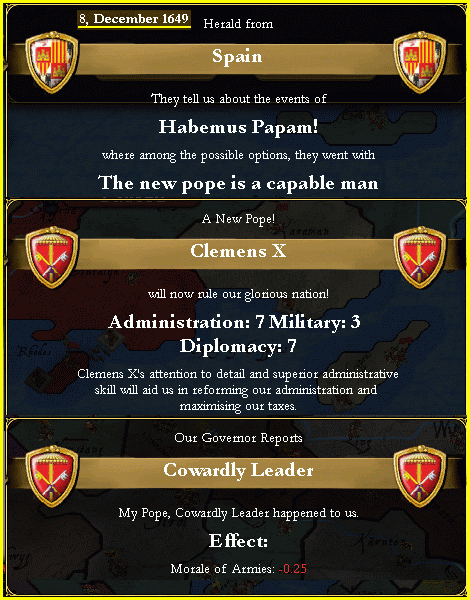
The Great Northern War
Clemens X might be a man of compromise and mediation, but history is written by unpredictable occurrences and war can be triggered by the silliest and trivialest of events. In March 1650 Władysław IV of Poland and Denmark (and in fact also of Norway and Lithuania, and many other titles) choked to death on a duck bone, leaving both thrones empty, and numerous greedy relatives more than willing to press their claims to one of the many component realms.
From Rome’s perspective it was vital to hold the diverse commonwealth together, and the only adhesive Clemens X’s administration could use was Catholicism, and the only means to apply this adhesive were Jesuits. They had spread across the lands in the North and created a out-and-out network of contacts. It was through them that the Pontiff negotiated with the Polish and Danish estates, showed them the need to stick together and assured them of the Catholic world’s support if need be.
Eventually, both assemblies elected a minor nephew of the late King as their joint monarch (who incidentally was one of the few Catholic candidates), at the same time they signed and act of the Union of Sjælland. This new Union brought the two entities much closer together, and steered the monarchy towards a semi-elective and semi-democratic state. The Preamble of the Union Act invoked the Providence as its instigator and the Pope as its protector. The new state was to have one parliament, one chancellery, one treasury and, as of then, one regency council, to be developed into an executive body at a later date.
However, the vision of the Catholic Union of the North, as the project was known in Rome, was wishful thinking at most. The merging was a work in progress, barely started, and, despite Papal legates’ efforts, both parties, the Polish and Danish elites, were distrustful of one another. As it often happens in history, what finally brought the two together was a common enemy. The Protestant Kingdom of Sweden felt encircled by its Catholic rival and decided on an pre-emptive attack.
What started as, and was later named, the Great Northern War, was in fact a harbinger of inter-confessional wars that will plague Europe in the decades to come. Both Poland-Denmark and Sweden soon called their allies to join the conflict and the two Catholic and Protestant camps advertised their cause throughout Europe. Clemens X was unsure how to act; on one hand he felt compelled to help the new state, which to some extent was his creation, on the other he was determined to try out and exhaust all other possible measures before turning to the last resort, war. (at first when I saw Poland inherit Denmark I went like: whaaat? I even considered editing the save, but having thought it over I came to a conclusion that in my alternative world this would not be so implausible; I should credit Sweden for going to war instantly and attacking the new state at its weakest; btw I have trouble coming up with a name for this new Pol-Den country; Pol-Den seems lame, any suggestions?)
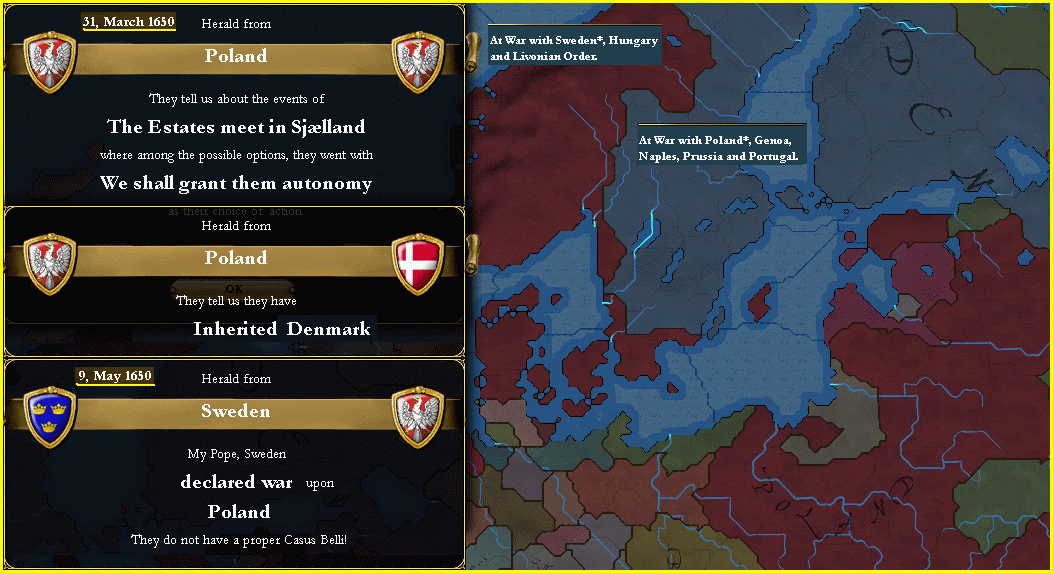
The Modena Gambit
Clemens X had other pressing concerns than the war in the North, and much closer to home; namely the Barberinis. After the death of Tomasso the older, Cardinals Antonio and Frederico made their d’Este sister-in-law and her children into their protégés. On the Cardinals’ inspiration Tomasso the younger, the new Count of Ferrara, on behalf of his mother, Amalia d’Este, pressed hard for Modena as her rightful heritage. The Emperor seeing it as an opportunity to snub the Pope supported this claim, officially acting as the champion of the Reformed creeds in North Italy. After much deliberation Clemens X relented, believing it was safer to have one’s rivals close and content.
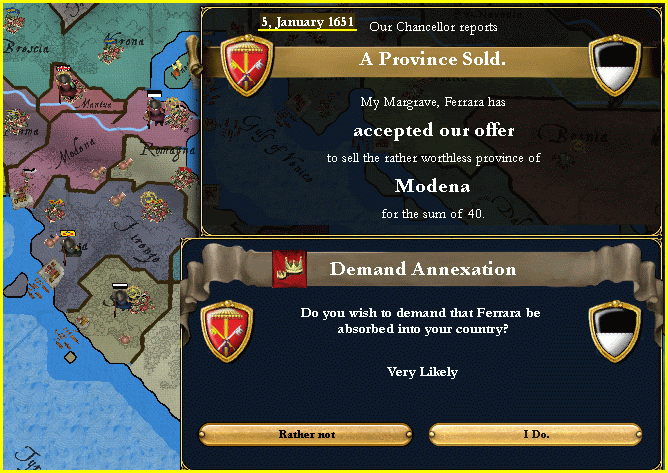
Short was the Barberinis’ joy; merely weeks after Tomasso’s elevation to the dual County Ferrara and Modena the young ruler died; like his father, after a severe bout of sweating illness. He had sired no heir. Amalia d’Este had two more sons; but the middle one, Gian, had been ordained and was being tutored for his future ecclesiastical career by none other but his uncle Antonio; the youngest one was a simpleton. The Cardinals had to petition Clemens X to allow Gian to renounce his clerical offices to let him seek to take a bride for the continuation of the Barberini dynasty, but the Pope initially did not release him from his vows.
After an animated bargaining the Barberinis got what they wanted and Gian was free to marry a Milanese princess, but Clemens X proved a seasoned negotiator and the conditions were harsh. ‘The new count and his subjects out of their free will petitioned to seek interminable alliance with the Holy Father’. The submission was almost complete, both counties retained independent treasuries and commercial freedoms; yet they were not allowed to carry out any foreign diplomacy without the consent of the Pope, and their armies were to be of only ceremonial nature. Religious freedoms were granted to all Christian confessions, but the Jews were forced to leave, Rome was the only place in the Papal States they were permitted to live. (if you see this as an exploit, be the first to cast the stone; I’d had the crown ‘annexation likely’ alert for some time (for Ferrara), but had been waiting for a diplomatically able pope; then I played the trick with selling Modena (Ferrara has a core there) and asking for annexation; success at the first attempt! the penalties for the autonomous estates are harsh, but I find the tax one really hurting; the trade one affects the trade that goes through Venice, I don’t trade there, the manpower penalty I can live with; and there are bonuses in return AND two extra universities; Ferrara is Reformed so it gets religious autonomy too, I don’t want trouble there so the Jews had to go)
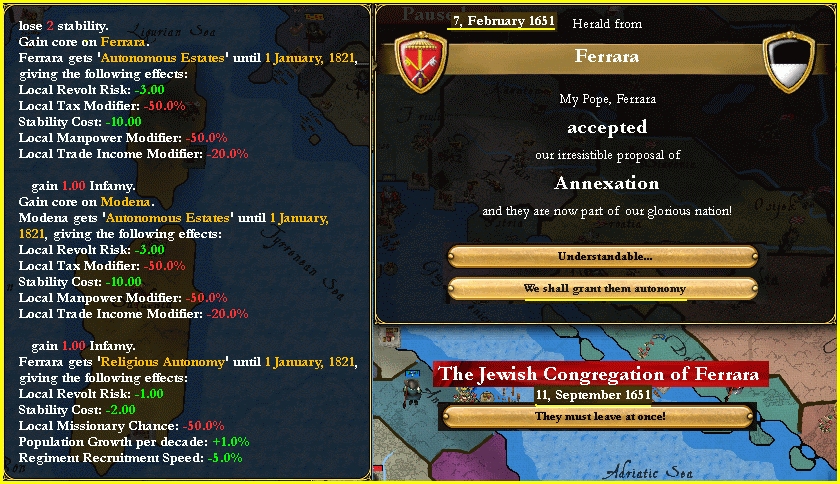
Religious Strife
In Hungary the Catholic insurgents got crushed and the victorious Protestant magnates forced Mátyás I not only to renounce his Catholic sympathies but also to throw his lot along with Sweden against the new Polish-Danish state. This ended badly for the monarch but also for the Protestant elite. The Hungarian nobles, aroused by the victory against the inner foe, overestimated their power. Meanwhile Rome discretely supported the Catholic Poles. Ultimately, Hungary got split in two, with a Polish satellite created in Transylvania. It was only owing to other Balkan states’ engagement that thus weakened Hungary managed to achieve a white peace with the Turk. (not much to say here except that I did send some expeditionary forces up North, through the port in Jedysan, my armies, on their way to Danzig, dealt with a few revolts in Poland, Poland’s terms may seem odd, but with the war up in the North, even white peace would be understandable)
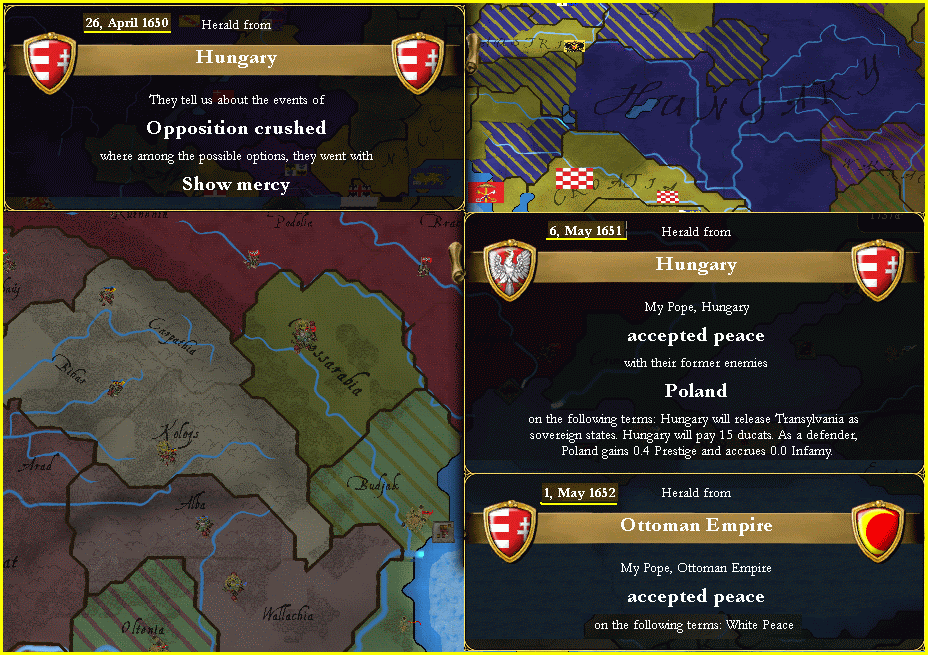
Obviously, Karl II Ludwig was not happy with being outsmarted by the Pope in the Modena gambit manoeuvre. He publically declared the Pope the rogue of European affairs and swore he with his Imperial might will guarantee protection to every, even the lowliest, Protestant subject within the Empire. To a rising alarm in Rome this proclamation was cheered in the streets of Ferrara, Modena, Parma and Milan.
Clemens X realised that in the light of the on-going Great Northern War this seemingly immaterial political demonstration might trigger a larger-scale conflict. To minimise the potential costs, again through Jesuits, he approached the French court. A secret pact was drawn up, both parties promised non-involvement in the Emperor-instigated wars, providing Rome would recognise French claims to the former Brittany and France would grant Catholics there freedom to practice their rite. (I believe by making the Protestant Palatinate the Emperor I broke some equilibrium in the HRE and triggered inter-confessional conflicts; if so for one I’m glad France is reluctant to join in the fun, and also I’m keen on to see how this Helius’ addition to the game will play out; I remember the Protestants were quite successful in the ‘war of the province’ first phase of the conflict; I had to help them with peacing out though; if I remember right the rules here, with ‘the long war’ are slightly different, I believe forging the alliances/camps has just started)
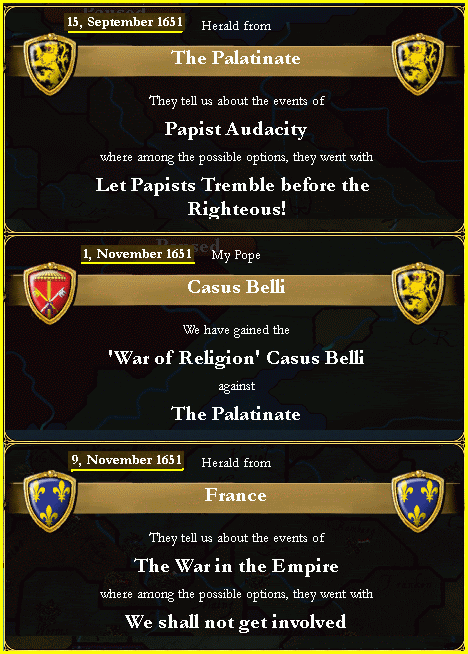
The Great Northern War had already engaged southern Catholic countries too, as Portugal, Genoa and Naples aided Poland-Denmark with their naval might; without their support the newly-created state would have stood no chance against the Swedish fleet. But as it turned out the combined efforts of the Catholic allies pushed Swedish vessels back to docks and a joint land invasion could be planned.
By this time Polish troops had been slowly but steadily pushing North, first they had taken Novgorod, then they had captured Neva and were encroaching on Viborg. But the Danish and Norwegian soldiers had already lost most of Norway and in the face of these defeats the Danish populace had risen in revolt. The Catholic allies decided to bring the war to the very heart of Sweden, thus damaging the enemy’s morale, hindering recruitment, and capturing depots and supply routes. In this they largely succeeded, but this success did not calm down the situation in Denmark; many locals deemed the Union an ill-fated affair.
Clemens X’s peaceful nature and diplomatic calculation prevented him from officially entering the conflict. However, he was more than eager to authorise the Papal peace missions in Denmark. Since 1654 Papal expeditionary forces patiently explained to the wayward Danes of Gotland, Fyn and Jutland the divinity of the Union of Sjælland project. (what can I say, I’m not surprised Sweden made such successful headway in Norway; on annexation all the troops (and navies) there evaporated; what I am surprised with is how apparently cleverly Polish AI chose its allies: Portugal, Genoa and Naples are all decent powers (the latter two thanx to me) with formidable navies, so they kept Danish islands and Jutland safe from invasion; and I’m truly amazed with the ferocity of the punch they delivered with their counter strike; my intervention is limited to quelling rebels, but I see it invaluable for Polish AI as rr went up to two-digit figures (on inheritance Poland got only one core: in the capital; frankly I don’t quite get the core giving mechanism here); and as Pope, at that point in the game, I want Pol-Den to thrive and become a Catholic power strong enough to check Sweden and stand up to Russia in the future)
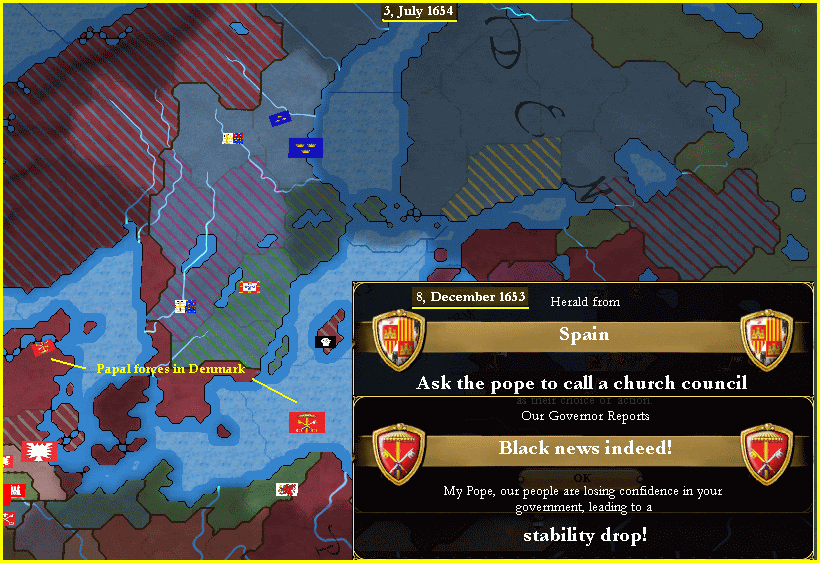
The New Thought
Clemens X’s reign is memorable in the annals of moral theology for the condemnation of a number of erroneous propositions; the Pope might have been lenient but not unconcerned in questions of theology. He was a moderate reformer, especially in questions of limiting financial abuse and nepotism within the Church. That is why he contentedly called and personally attended the Council of Mainz (the location was another jibe to jeer at Karl II Ludwig). In the course of the council resolutions to abolish the practice of annate were adopted; Catholic middle-level hierarchy did not receive the news well. (the council was painless, save stability hits; and I still regain stab fairly quickly)
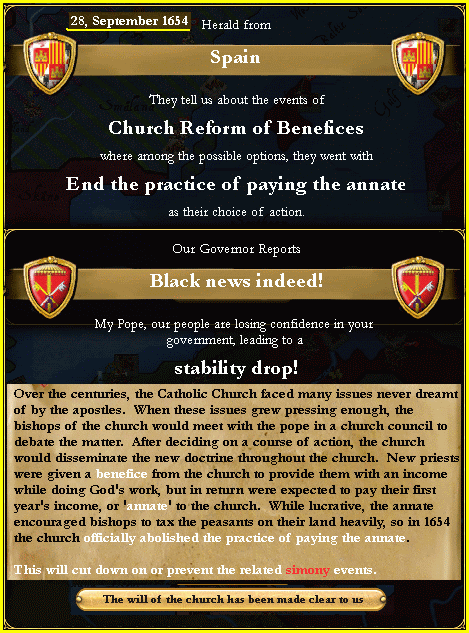
A few more hot-headed ones tried to stir commotion and looked for a possible temporal power to sponsor their cause. Nothing major came out of this. Spain was at the time strong enough and Clemens X enjoyed Alfonso XIII’s backing. The peace mission in Poland-Denmark paid off as neither Polish nor Danish nobility would support anti-Pope sentiments; so grateful were they for the Papal involvement, especially as it felt the Great Northern War was reaching its critical stage: Sweden seemed to have exhausted its resources, even though it got a foothold on Iceland. The other Catholic states were either too busy or too feeble to risk opposing Clemens X. (Spain ruled by the able Alfonso XIII D8A5M9 seems quiet: rare revolts, but still is at -2/-3 stab most of the time; the war in the North went past its critical point I guess, Sweden is losing; the longer it perseveres, the more bankruptcies are ahead; as for Iceland I really don’t understand (no offence intended) why it has two provs and not one, clearly politically/economically it was nothing like also two-province-in-the-game Sicily)
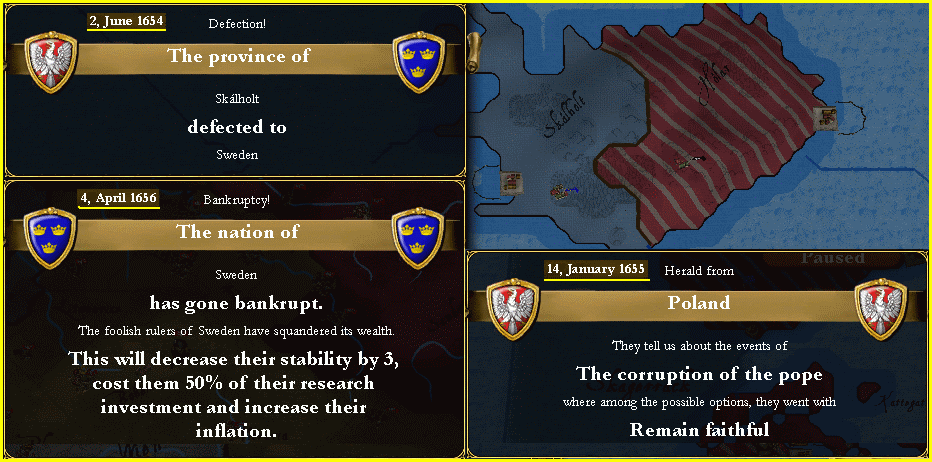
Some claim the peaceful reign of Clemens X marks the end of religion as a driving force in European politics; in this respect religion was believed to have been replaced by geopolitical or economic considerations. True, Clemens X rarely mentioned the proselyting New Pharos policy and the Union of Sjælland scheme was more about retaining status quo than spreading the True Faith. But in the eyes of recent interpretations the 1650s were actually the time of polarising the two religious camps’ bearings. It has to be admitted though that the Papal States apparently at about this time came to terms with the existence of powerful Protestant entities in the western Europe, and their ambitions in the New World, and resolved to negotiate rather than fight with them. (I found it difficult to interweave the ‘age of reason’ event into my story, but oddly I haven’t fought France or England for decades and frankly I wouldn’t like to, so let it be this way; both of them seem to have turned their back on European affairs to, they picked MCaE as their 7th NI; you’ll also see I spent quite a lot of money: I’m investing in the textile manu in Thrace, silk producing province, this should make it filthy rich; the construction is almost completed; also Anatolia is now my NF and there are canals in all neighbouring provs; btw the situation in the north got even more complicated: Liv attacked Riga, which is protected by England but that’s good news: Protestants' in-fighting)
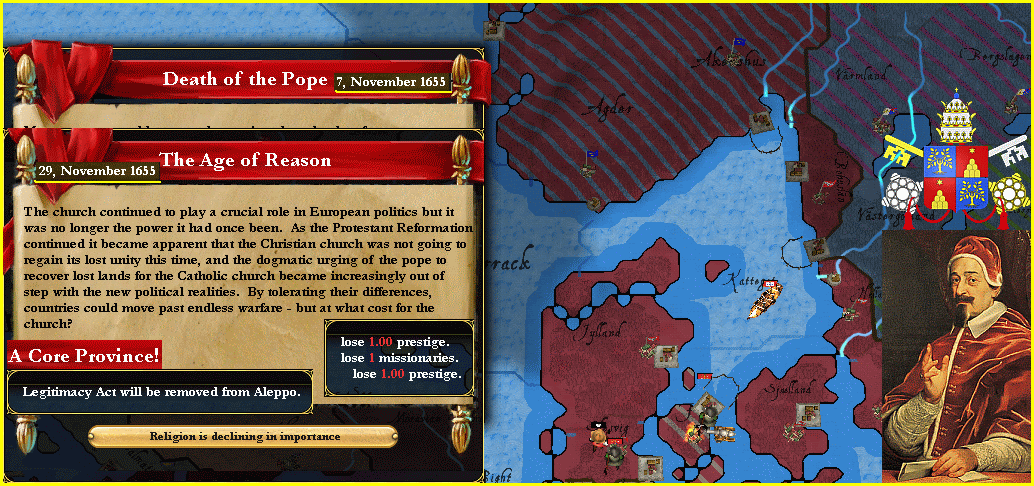
The Papal peace mission in Denmark at the time of Clemens X’s death
Treasury / yearly income: 806d / 109,6
Merchants: 5 in Thrace: 70.02/455.05 and 5 in Alexandria: 104.58/679.86
Fleet: 8: 1 early usciere, 3 flytes, 4 cogs
Army: 27k Offensive musketeers; 6k Carabiners
Manpower / discipline: 44.104 / 114.60%
Army / navy tradition: 39.00% / 0.00%
Prestige: 96
Stability: 0
Infamy: 2.9/20.50
War exhaustion: 0.00/11
A very interesting reign thus far. Clemens remaining as aloof from war as possible is undoubtedly a good thing, the Papal States requires some time to recover and strengthen her lands. In gaining Ferrara this will certainly aid her. I rather like his focussing on peaceful diplomatic matters rather than war, the creation of Pol-Den (perhaps Polmark or Denland?) quite possibly an inspired decision, even if it has led to the current Great Northern War it has consolidated Catholic power in the region. The likely defeat of Sweden certainly no bad thing either.
These unions rarely last long in the hands of the AI, but I agree it's worth supporting it. And glad you made the most of a high-dip Pope, diplo-annex opportunity windows are often quite narrow.
What are the western powers up to in the New World?
What are the western powers up to in the New World?
reads as if, the Ferrara gambit apart, that Clemens operated in a manner very aloof to all the petty squablings going on ... while at the same time rather astutely building an alliance system to keep a balance of power
As I am a man of cliche, I vote for the name 'The Baltic Union' or 'The Baltic Commonwealth'.
Well, Fabio Chigi...I have known him only as a Papal legate (in regard to the Peace of Westphalia)...and he was an OTL Pope as well? Well, one learns new stuff every day .
.
AFAIK Poland gets a special RR addition when overreaches in MM, does not it? GL with preserving it .
.
Wow, the Livonian Order still exists? Good for them . (I am a big Livonian and Curonian fan)
. (I am a big Livonian and Curonian fan)
Also, buy CK 2, please...the amazing stories you could build with it! Your CK2 AAR would be so awesome ! And it has Navarra with unique succession laws in it
! And it has Navarra with unique succession laws in it  .
.
Well, Fabio Chigi...I have known him only as a Papal legate (in regard to the Peace of Westphalia)...and he was an OTL Pope as well? Well, one learns new stuff every day
AFAIK Poland gets a special RR addition when overreaches in MM, does not it? GL with preserving it
Wow, the Livonian Order still exists? Good for them
Also, buy CK 2, please...the amazing stories you could build with it! Your CK2 AAR would be so awesome
I've been lurking here since the beginning. Great job so far!
Thought I'd chime in with a thought on the Pol-Den question. The classical way to deal with such a situation is to name it after the ruling dynasty, as in the Jagellonian Empire.
Keep up the good work!
Thought I'd chime in with a thought on the Pol-Den question. The classical way to deal with such a situation is to name it after the ruling dynasty, as in the Jagellonian Empire.
Keep up the good work!
Quite an exciting pontifficcate, although the Papal State was not involved in any wars. May I ask what was the purpouse of selling the province to Ferrara if it means 50% less tax in the long run?
About Poland, the Union of Sjælland looks nearly exactly like the Union of Lublin (except that it wasn't triggered by the death of a king IRL and the countries were different), so I guess the officiall name would be Rzeczpospolita Obojga Narodów (Commonwealth of the Two Nations), which is nearly always shortened to Rzeczpospolita (Commonweallth). But I believe that "The Baltic Commonwealth" both sounds good and plausible (at least for non official use), so I vote for it.
About Poland, the Union of Sjælland looks nearly exactly like the Union of Lublin (except that it wasn't triggered by the death of a king IRL and the countries were different), so I guess the officiall name would be Rzeczpospolita Obojga Narodów (Commonwealth of the Two Nations), which is nearly always shortened to Rzeczpospolita (Commonweallth). But I believe that "The Baltic Commonwealth" both sounds good and plausible (at least for non official use), so I vote for it.
Quite an exciting pontifficcate, although the Papal State was not involved in any wars. May I ask what was the purpouse of selling the province to Ferrara if it means 50% less tax in the long run?
Modena is an imperial territory, so he may have been trying to avoid the negative consequences of "Laws of the Empire", where the Emperor decides whether you need a beat-down (or not).
Modena is an imperial territory, so he may have been trying to avoid the negative consequences of "Laws of the Empire", where the Emperor decides whether you need a beat-down (or not).
yep, to get the core and avoid imperial admonition.
You could make a name for the Union based on the name of the city where the estates met to form it, like the Kalmar Union. This way you could name it just about whatever you want: "Gdansk Union"? You could also give it a more political name that seeks to legitimize its war(s) against Protestants: "Great Catholic Commonwealth of the North/Baltic"
Great job annexing Ferrara and Modena (I've personally never seen a vassal annexation higher than "Maybe" in MMU), but Urbino is still out there
Last edited:
In March 1650 Władysław IV of Poland and Denmark (and in fact also of Norway and Lithuania, and many other titles) choked to death on a duck bone, leaving both thrones empty...
:huh: And I always thought the fat content of duck confit was the dangerous part...
As for the nomenclature of the Danish-Polish union, I am partial to the Jagellonian Empire appellation suggested by Ahriman, but the Union of <Cityname> (as in Kalmar Union) suggested by CJL78 is great, too—plausible and has a nice precedent in history.
However, the vision of the Catholic Union of the North, as the project was known in Rome, was wishful thinking at most. The merging was a work in progress, barely started, and, despite Papal legates’ efforts, both parties, the Polish and Danish elites, were distrustful of one another. As it often happens in history, what finally brought the two together was a common enemy. The Protestant Kingdom of Sweden felt encircled by its Catholic rival and decided on an pre-emptive attack.
I suppose it's nice for you to have a BIG, burly Catholic state to glower at mostly-Protestant central Europe... but heaven forbid Poland-Denmark comes out of the Great Northern War in possession of Sweden, too! Can you imagine how much a united Scandianavia + Poland would mash the hell out of the HRE? In real life, such an agglomeration of power would attract some serious counter-balancing and prompt both Protestant and non-Protestant neighbours to come together in mutual defence. Hopefully the AI settles for relatively minor concessions instead of a major territory grab.
On the Cardinals’ inspiration Tomasso the younger, the new Count of Ferrara, on behalf of his mother, Amalia d’Este, pressed hard for Modena as her rightful heritage. The Emperor seeing it as an opportunity to snub the Pope supported this claim, officially acting as the champion of the Reformed creeds in North Italy. After much deliberation Clemens X relented, believing it was safer to have one’s rivals close and content.
I am glad to see an Este ruling Ferrara—well, until Pope Clement got his mitts on it.
Oh, and are you going to do anything deliberate to avert schism (like maybe sell off eastern territories to the Knights, or some suitable Catholic ally)? Or keep them and wait around to see what happens?
I enjoyed Clement X's reign and the way you played it appropriate to his in-game stats. Can't wait to see what's next!
I suppose it's nice for you to have a BIG, burly Catholic state to glower at mostly-Protestant central Europe... but heaven forbid Poland-Denmark comes out of the Great Northern War in possession of Sweden, too! Can you imagine how much a united Scandianavia + Poland would mash the hell out of the HRE? In real life, such an agglomeration of power would attract some serious counter-balancing and prompt both Protestant and non-Protestant neighbours to come together in mutual defence. Hopefully the AI settles for relatively minor concessions instead of a major territory grab.
I seriously doubt it will last long. Given Poland's navy, Sweden is likely to win without Poland able to build troops in Denmark-Norway, and whatever Sweden doesn't take I expect Denmark and/or Norway could revolt without Poland's ability to quell rebels there. But, it would be neat to see Poland unite all the lands between Russia and the HRE, so lets see what happens
Kroisistan:
My thoughts exactly. But I fear the more land I take, the beigger the threat of schism. So I have to go cautiously about Trebizond.
I have noticed a number of Schism events in your game. Is its MTTH directly related to how many provinces the Pope controls, regardless of whether you have cores in them? Or is it only because of expansion?
Maybe the solution is to mod in a state to take some of your Eastern holdings off your hands. Looking at the Martinus VI map, the two most plausible states would be a Latin Empire, or a Kingdom of Jerusalem. I'd lean towards a KoJ that unifies your Syrian provinces and Cyprus with Venetian and Genoan holdings in Palestine. It could take at least 4 provinces off your hands, and it's more realistic than the Pope giving up Alexandria or Constantinople.

